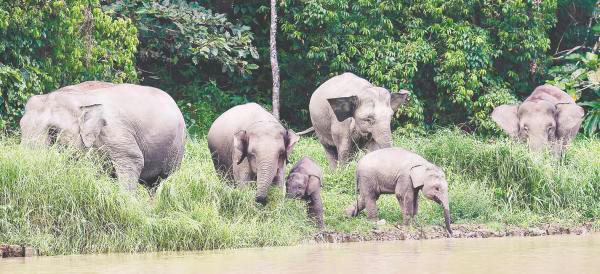THE theme this year for World Environment Day “Our Land, Our Future” resonates deeply with the essence of our existence and the legacy we leave for future generations.
The land we inhabit is not just a geographical entity but a life-sustaining resource that embodies our heritage, culture and future potential.
In Malaysia, our land’s rich biodiversity, fertile soils and breathtaking landscapes are treasures that warrant our utmost respect and protection.
The urgency to value and protect our land from further environmental degradation and destructive activities has never been more critical. There is no future if our land is destroyed.
Source of life and heritage
Malaysia has abundant natural resources, ranging from the lush rainforests of Borneo to the fertile plains of Peninsular Malaysia. These ecosystems are home to an incredible diversity of flora and fauna, some of which are found nowhere else on Earth.
The Malayan tiger, the Bornean orangutan and the Rafflesia, the world’s largest flower, are just a few examples of our land’s unique species. These natural wonders contribute to the ecological balance and hold immense cultural significance, symbolising our nation’s rich heritage.
Our land is also a vital source of sustenance. Agriculture, a cornerstone of Malaysia’s economy, relies on fertile soils to produce essential crops such as palm oil, rubber, rice and various fruits and vegetables.
These agricultural products feed our population, drive economic growth and provide livelihoods for millions of Malaysians. The land’s intrinsic value as a food, water and resource provider underscores its preservation necessity.
Malaysia was the world’s largest producer of natural rubber for much of the 20th century. The rubber industry began to boom in the early 1900s, and by the 1930s, Malaya had become the leading producer of natural rubber globally. This position was maintained into the late 20th century, with significant contributions continuing until the 1980s.
As for palm oil, Malaysia became the world’s largest producer and exporter in the 1970s, a position it held until Indonesia surpassed it in the 2000s.
Palm oil production has been a significant driver of Malaysia’s economy, reflecting the country’s strategic shift from rubber to palm oil as the primary agricultural export.
According to recent data, about 1.07 million hectares of land in Malaysia are dedicated to rubber plantations, with approximately 90% of the production managed by smallholders.
Malaysia has around 5.8 million hectares of land under cultivation for palm oil, about 30% of the world’s total palm oil production area.
Call to action
Despite its importance, our land faces numerous threats from environmental degradation and destructive human activities. Deforestation, unsustainable agricultural practices, industrial pollution and urbanisation are significant contributors to land degradation in Malaysia.
For instance, the expansion of plantations has led to the clearing of vast tracts of rainforest, resulting in habitat loss for endangered species and contributing to climate change.
The consequences of land degradation are far-reaching. Soil erosion, reduced agricultural productivity, loss of biodiversity and increased vulnerability to natural disasters are just a few of the adverse impacts.
Moreover, the degradation of our land compromises the quality of life for present and future generations, threatening food security, clean water supplies and overall well-being.
To safeguard our future, we must take decisive action to protect our land. This includes implementing sustainable land management practices, enforcing strict regulations against illegal logging and land clearing and promoting reforestation and afforestation initiatives.
Additionally, we must support and empower local communities, especially indigenous groups (Orang Asli), who are often stewards of our natural resources and possess valuable traditional knowledge on sustainable land use.
Success stories
Malaysia has made commendable strides in environmental conservation, offering hope and inspiration for future efforts. The Heart of Borneo initiative, a transboundary conservation project involving Malaysia, Indonesia and Brunei, aims to protect the ecological integrity of Borneo’s rainforests. This initiative has successfully conserved large forest areas, promoted sustainable development and preserved biodiversity.
Forest Management Units (FMUs) in Sabah: This initiative allows concessionaires to develop parts of degraded areas for agriculture while reforesting and protecting other sections. Although there have been challenges, the FMUs have provided incentives for sustainable forest management, with some corporations showing commitment through long-term agreements. The reforestation efforts in the Kinabatangan Wildlife Sanctuary in Sabah have restored degraded lands, creating wildlife corridors connecting fragmented habitats and supporting species such as the Bornean pygmy elephant and the proboscis monkey. These success stories demonstrate that reversing environmental degradation and building a sustainable future with collective effort and commitment is possible.
Tropical Rainforest Conservation and Research Centre (TRCRC): TRCRC focuses on preserving and restoring tropical rainforests by implementing projects like the Tropical Rainforest Living Collection in Merisuli, Sabah. This project aims to protect and cultivate rainforest species, engage the local community, and promote environmental education.
WWF Malaysia’s efforts: WWF Malaysia collaborates with the government and various stakeholders to combat forest loss and promote forest restoration. Initiatives include promoting sustainable palm oil practices through the Malaysia Sustainable Palm Oil (MSPO) certification, which aims to reduce deforestation and ensure responsible agricultural practices.
Malaysian Palm Oil Certification Council: Since 2020, the MSPO certification, mandatory for large oil palm producers, ensures that palm oil production meets sustainability standards. This programme has successfully reduced deforestation rates and encouraged more sustainable agricultural practices.
Collective responsibility
Let us reaffirm our commitment to valuing and protecting our land. “Our Land, Our Future” is not just a slogan, it is a call to action that demands immediate and sustained effort.
By embracing sustainable practices, advocating for more robust environmental policies and fostering a sense of stewardship, we can ensure that our land remains a vibrant and life-sustaining resource for generations to come.
Malaysia and the world’s future depends on our choices today. Let us choose to protect our land and secure our future.
Let us start from our homes and workplaces by treating waste with respect, not neglect.
Ravindran Raman Kutty is Captain Planet and a passionate environmental, social and governance enthusiast. Comments: letters@thesundaily.com









